Maria Savva's Blog - Posts Tagged "win"
Enter to win a copy of my new novel 'Second Chances'!
Pinnacle:Author and Book Promotions is giving away one copy of my latest novel.
Here's the link: Win Second Chances!
You can enter between now and the 17th September 2010
Good luck!
Here's the link: Win Second Chances!
You can enter between now and the 17th September 2010
Good luck!
Published on August 19, 2010 07:19
•
Tags:
giveaway, maria-savva, second-chances, win
Meet Nestor Maronski & your chance to win a pdf of Cutting The Fat!
As many of you will already be aware, I recently wrote a murder/mystery novella with author Jason McIntyre.
This week, author Stacy Juba is featuring the lead character from that novella, the evil reviewer, Nestor Maronski, on her fictional online game show.
The game show is an ongoing contest on Stacy's blog to celebrate the release of her latest novel Sink or Swim which is a murder/mystery based on a reality TV show.
You can help support me and my co-author Jason, by leaving a comment on Stacy's blog interview with Nestor. The 3 fictional characters who get the highest number of unique commenters on their posts will win!
There is also a chance to enter to win a pdf copy of Cutting The Fat!
Click here to read the interview: Nestor Maronski Interview

This week, author Stacy Juba is featuring the lead character from that novella, the evil reviewer, Nestor Maronski, on her fictional online game show.
The game show is an ongoing contest on Stacy's blog to celebrate the release of her latest novel Sink or Swim which is a murder/mystery based on a reality TV show.
You can help support me and my co-author Jason, by leaving a comment on Stacy's blog interview with Nestor. The 3 fictional characters who get the highest number of unique commenters on their posts will win!
There is also a chance to enter to win a pdf copy of Cutting The Fat!
Click here to read the interview: Nestor Maronski Interview

Published on March 03, 2011 05:23
•
Tags:
contest, cutting-the-fat, free, giveaway, jason-mcintyre, maria-savva, murder-mystery, novella, pdf, reality-show, sink-or-swim, stacy-juba, win
Meet Charles Blanchard, author of 'Mourning Doves After The Fire', and enter to win a signed copy!
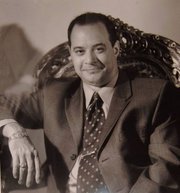
Sometimes when you read a book, you can tell that there is something special about the author, you can feel the passion they have for writing, and you can foresee great things for them. That is how I felt when I read Charles Blanchard's debut novel,Mourning Doves After The Fire.
I met Charles online when I reviewed his novel for Bookpleasures.com. He is just starting out in his writing career, but I just know he is going to be a name to look out for in the future.
Here are Charles's replies to my interview questions:
When did you first discover your love of writing?
I don't know if I can honestly say that I love writing. It is very difficult. As an architect designs a building, you have to start with a blueprint or outline and then attempt to seamlessly support the outline with as much valuable information and creative narrative as possible and hope and pray that what you have created is strong enough so the building doesn't collapse. It takes discipline and patience. The enjoyment for me comes after I have completed a piece of writing and when I know its good enough to go on to the next paragraph.
Is there a particular author, or book, that inspired you to start writing?
I was inspired by what was possible with the written word in the works of Marcel Proust and Thomas Pynchon. In the case of Proust, I found that reading just a few pages of Remembrance of Things Past, at night before retiring, satisfies my literary intake for the day as the sentences are so broad and rich yet they convey the simplest action or thought or emotion. For example, it is easy to say, "She was very attractive but very different from other actresses as she had none of the diabolical expressions that I would have expected given her chosen profession." If you had given that sentence to Proust, he would say, "I felt somewhat disillusioned, for this young lady was in no way different from other pretty women whom I had seen from time to time; only better dressed. I could find no trace in her of the theatrical appearance which I admired in photographs of actresses, nothing of the diabolical expression which would have been in keeping with the life she must have lead." Incredible usage of words.
When I read bits from Thomas Pynchon's Gravity's Rainbow, I lose the storyline, but it doesn't matter. I just enjoy the ride. Each new scene seems to have nothing to do with the preceding scene as if Pynchon wrote whatever came into his head at the moment he was writing it. Every scene is so rich and wonderfully written that the pure enjoyment of being in the hands of such talent is rewarding enough.
In your debut novel, Mourning Doves After The Fire, there are many references to classical music, is that your favourite type of music?
I enjoy many types of music including classical, pop, and light jazz. I usually play classical when I am writing as it seems to add to the creative process without being distracting.
Abby Whitman, the main character in the novel is a pianist, are you musical?
Abby is like so many who have the desire to find their place in the world. She is never a great pianist but she does come into contact with Madison, a younger girl who like Abby, plays classical music on the piano and Madison clearly has more talent. They do share that common bond between them in the summer camp. I do not play an instrument myself. I wanted to combine my appreciation for music, as it is so much a part of my life every day, into a fictional narrative with characters who also share an interest in music and in the composers of the past.
Mourning Doves is set in 1910. Historical novels are notoriously difficult to write because there is so much research involved to make sure that all the historical detail is accurate. How did you go about researching the historical data for the book and did you find it difficult?
Researching was the best part of the work. There was always something new to discover. I read diaries of doctors who lived in the time of my novel to get a sense of how they thought of themselves as medical practitioners and how they were perceived by the community they were in. And how to be careful not to allow their emotions to get in the way of their work. I found it fascinating. It was also fun to research the clothes people wore at the time. What they did for fun as well as attempt to capture the struggle of daily life and to find love, one hundred years ago.
Your novel is also part fable, as we follow the group of birds in their struggle to survive. That’s an interesting concept. What gave you idea of including the birds as characters in your book?
I have a large tree outside my apartment here in New York and each morning and night the birds wake up and chirp away with such enthusiasm they wake me up in the morning and not my alarm clock. I wonder what they could be talking about. Do they actually communicate with each other in a way that we as humans do not understand? I'm certain that they do. I believe they are chatting away about where they are going to find food and at night they are gathered again in the tree chatting away about their experiences they had that day in their search for food. They could also be talking about one of their own who may have died. That led me to think about the obstacles that animals face everyday not only in the interaction with other animals but interacting with humans. I began to read a bit of fiction where the main characters are animals that speak and think just as humans do. The idea for the primary animal character to be a mourning dove came about as a mourning dove was and is almost always on my window sill asking for food, so I leave some bread there once in awhile.
That led to research on the living habits of birds and how they relate to their human counterparts - how we look after them by feeding them, cleaning up after them, as they come to expect that there will be food waiting for them in the same place and at a certain time of day, much the same as parents look after their own children. I gave the birds a distinct voice as I felt corresponded with the setting of the story - they live in the large oak tree near the main character's home, and how they would react not only to their own daily struggles but also by placing a human character nearby who occasionally takes time to notice the birds once in awhile. In a way, the lives of man and beast are intertwined more often without realizing it.
When Abby Whitman discovers that she has cancer, her doctor tries a revolutionary treatment on her. Did you have any medical knowledge before writing the book, or was your portrayal of this based on research, or just totally made up?
Part of the book deals with the treatment of cancer that was available in 1910. Actually there was no real treatment, only surgical procedures to remove the cancer, provided it did not spread too far. I came across a doctor who did actually experiment treating cancer patients by injecting bacteria into the tumor in the hope that the antibodies would attack not only the bacteria but the tumor into which the bacteria was injected and hopefully destroying the tumor or shrinking it considerably. The patients who were deemed as suitable candidates for this procedure was if the tumor was localized, not spread out in the body. This was the most interesting part of the research.
How long did it take you to write Mourning Doves?
About two years - most of that time was devoted to research and the actual writing was about seven or eight months.
There are many characters in your novel. Did you base any of them on people you know, or are they totally fictional?
They are all fictional. I populated by book with characters who have had a life prior to their introduction into the story. Even if a character is only in one chapter, I researched what they might have done prior to their life in the book to give substance and some depth to them without digressing too much and keep the story moving.
Which one of the characters in Mourning Doves can you most relate to, and why?
The characters are so varied, and each one displays his or her own abilities according to their strengths and weaknesses including the widowed mourning dove. I would choose the two main characters as I felt I became better acquaintance with them as the story progressed. Abby Whitman exhibits courage and determination and trust in her doctor when he approaches her regarding an experimental treatment for eradicating the cancer inside her. Dr. Raymond Fletcher, who secretly cares for Abby beyond his professional capacities, comes from a broken home. His efforts to save Abby's life become his reason for living. We see the frayed relationship he has with his father when upon his mother's request, Dr. Fletcher visits his parents, whom he has not seen for a long time and an attempt is made to reconcile with his estranged father.
Do you have an tips for someone who is considering self-publishing their own book?
As this is my first published work, the idea of attempting to seek an agent who would genuinely represent a first time novelist and attempt to convince a publishing house to “take a chance” on me, was too daunting a task to even contemplate so I chose to self publish.
I knew of the POD company, Xlibris, from correspondence over the years and I did some research on their current mode of operation. When they sent me an email offering half off their publishing packages, I thought $1500 for a premium package was doable so I went with it. I must say that the final product (hardcover and softcover) was well done, nice cloth binding , etc. Xlibris is rather unusual in the sense that when you call them, you will reach their customer service, located in the Philippines. The executives who run Xlibris do not have any contact information at all, so you are essentially at the mercy, if you will, of an overworked CS rep in a distant country who has to listen to complaints all day.
The bottom line is don’t expect to make millions with a self published book. The marketing which is mostly the responsibility of the author takes tremendous effort and the expectations should be realistic. At the very least, the book is yours and you have control over every aspect of it from the editing to the design of the cover. You have to continue your passion and begin another book so you can build a nice resume of work. Who knows, maybe one day the effort will be truly appreciated, but don’t get depressed if you don’t get a call from one of Oprah’s people begging you to be on their show.
Who are your favourite authors and what is it about their writing that you like?
One of my favorite novels is Cold Mountain by Charles Frazier. The writing captures the rhythmic flow of the language of the late 19th century with such grace and beauty that reading it is like listening to a piece of music. There is also a sense of place. The description of landscape and man's relationship to the land is vivid and becomes as important a part of the novel as the main character, Inman.
Are you reading a book at the moment?
I am reading The Stones Of Summer. Its a novel by Dow Mossman, published in 1972. When it came out, it received rave reviews and then the book and author went unnoticed for 30 years until a fan of the book attempted to find out how a book that good could just disappear without a trace. He made a documentary about his efforts to locate the author. Before the documentary came out, the book wasn't even listed in the New York Times Book Review Index for 1972. The Stones of Summer is without question, the Holy Grail of modern literature. Never before have I read such descriptive passages. Consider the first paragraph. "When August came, thick as a dream of falling timbers, Dawes Williams and his mother would pick Simpson up at his office, and then they would all drive west, all evening, the sun before them dying like the insides of a stone melon, split and watery, halving with blood. August was always an endless day, he felt, white as wood, slow as light."
What do you think of ebooks?
As a book collector, I prefer the traditional hardcover book. I buy paperbacks on Amazon and I always reserve books through my local library. There is a facility that the ebook reader provides. For example, it's portable and it can carry hundreds of books in a single device as opposed to carrying heavy books around. In a way it's like having a library at your fingertips. But does one actually have the time to read hundreds of books at once? I am used to having at least a couple of books in my carry on bag. When I read a book I like to feel the pages as I am turning them. That feeling is lost on an ebook device. Also, I must admit that while browsing current fiction in the bookstores, I have been so attracted by the jacket that I purchased the book right away. One cannot add a book with a beautiful cover design to their home library if it only exists as an ebook. I also realize that we live in a world where paper is not environmentally friendly. Go figure. One cannot ignore the rise in ebook sales. We as authors who love print must accept that we live in a digital world, where eventually most of the profit we derive from our published work will come from ebook sales.
How important are reviews for you as a writer?
Reviews are important as they give varied opinions and creative suggestions on the work, often on things the author may have missed. And it does help to have that input from the reader who is after all the intended recipient of ones effort.
How did you go about choosing a cover for your book?
I designed the cover myself. I took sheet music and stained it with tea. I set fire to certain sections of the sheets to give it that burned look that it had been partially destroyed in a fire. Lastly I painted bird footprints in bright red paint over the burned sheets.
What are you working on at the moment?
I am working on a novel in which all of the characters are primarily animals with their own voices and ideas and obstacles to overcome.
Where can people buy your book?
The book is available as an ebook, softcover and hardcover on many websites including Amazon, Barnes & Noble, and Borders. Here are some links.
Amazon.com
Amazon.co.uk
Barnes and Noble
Borders
Books on Board
Do you have your own website or blog where people can read more about your work?
The book webpage is: Mourning Doves After The Fire
Thank you, Charles, for answering my questions :)
Now, here's your chance to win a signed copy of Mourning Doves After The Fire. Leave a comment below, and you'll be entered into a draw! One lucky winner will be picked on 12th April 2011.
Good luck!!
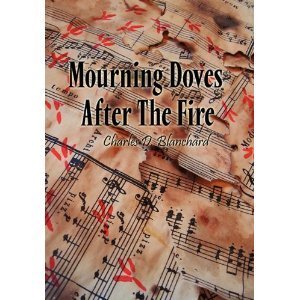
Published on April 07, 2011 08:46
•
Tags:
author-interview, book, charles-blanchard, debut-novel, giveaway, mourning-doves-after-the-fire, novel, win
Want the chance to win a copy of The Dream?
As most of you know by now, my latest book, The Dream, a fantasy/paranormal/timeslip novel, is now out in the world.
There are two giveaways you might like to know about:
1. On LibraryThing you can enter until 14th August 2011 to win a copy in the Member Giveaways: LibraryThing
2. On The Secret Writer Blog, I have a written a guest post all about the trials and tribulations of an indie writer's life, and until 13th August 2011 you can enter to win a copy of The Dream.
The Secret Writer
Good luck!
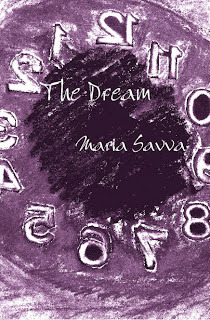
There are two giveaways you might like to know about:
1. On LibraryThing you can enter until 14th August 2011 to win a copy in the Member Giveaways: LibraryThing
2. On The Secret Writer Blog, I have a written a guest post all about the trials and tribulations of an indie writer's life, and until 13th August 2011 you can enter to win a copy of The Dream.
The Secret Writer
Good luck!

Introducing, Sandra Yuen MacKay, author of 'My Schizophrenic Life' & enter to win an ebook!
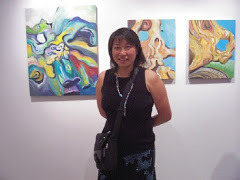 My guest this week is the multi-talented Sandra Yuen MacKay. She is an artist and writer. I first connected with Sandra via Goodreads over a year ago.
My guest this week is the multi-talented Sandra Yuen MacKay. She is an artist and writer. I first connected with Sandra via Goodreads over a year ago. When I read her memoir,My Schizophrenic Life: The Road to Recovery From Mental Illness, I was in awe at how someone who had battled through a mental illness was able to achieve so much. She is a special person and a kind and generous friend. I'm happy we became friends, and would recommend that everyone read her memoir if only because it blows away some myths surrounding mental illness and tells the story through the eyes of someone who lives with the struggle and is able to stand as an inspiration and role-model for others.
As well as agreeing to answer my questions, Sandra is giving away an ebook copy of her memoir, or her new book, Hell's Fire, to one lucky reader of my blog. All you have to do to win is leave a comment below, or simply 'Like' this post, and we'll enter you into the draw. A winner will be picked at random on the 1st October 2011.
Here's the interview:
Do you have any tips for someone who is considering self-publishing their own book?
Self-publishing isn't for all writers. Ask yourself, how much money, time and effort are you willing to put into it? Self-publishing gives you control over the content and design of your book and also a larger profit per book sold. If you do self-publish, make sure you edit and proofread your work closely or find someone to do it beforehand. Having said that, you may have a quality book but you still need to promote it.
Weigh your options. If you are concerned about upfront costs consider print on demand or e-books. Do you need an ISBN and do you need to register it? BestsellerBound, an indie website, may connect you with other self-publishers who can answer questions you may have. Word of mouth and building a professional website are a good starting point. Free book giveaways or blog tours may be useful. Even if you have a traditional publisher, you still should promote yourself.
Your book ‘My Schizophrenic Life’ deals with your personal journey and road to recovery from mental illness. I think it’s a book that should be read by mental health professionals as it gives insight into what someone with schizoaffective disorder is thinking and feeling. Have you had any feedback from any psychiatrists or psychologists who may have read the book and if so, what sort of comments do they have?
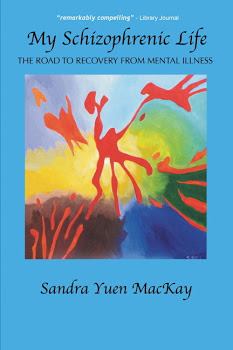
Yes I have. David Laing Dawson, a psychiatrist, writer, and filmmaker wrote: "Puts the reader nicely in her shoes experiencing the paranoia, misinterpretations, hallucinations."
Julie Holland, a psychiatrist and author in New York wrote: "There are precious few people who have experienced psychosis and can convey it accurately, clearly, and concisely. Sandra MacKay's story is an important one for all of us in the mental health field - doctors, patients, and their families. It is imperative that we take in the lessons she is imparting to us all, on how to manage, and in many ways, triumph over chronic mental illness."
I've received many favourable comments from people in the health field including occupational therapists and psychotherapist Laura Schultz (see link below for reviews).
You have suffered from your mental illness since you were a teenager. Do you think the mental health system (doctors/hospitals) has improved in the time since you were first diagnosed? Also, what do you think they could be doing better?
Previously, medication and electric shock treatment were the most common ways to treat the mentally ill. Since then, they introduced the recovery model, which puts the client first and is built around his or her needs and goals. Health professionals are moving toward a more holistic approach to treating clients. In Vancouver, BC, there seems to be more community supports and organizations to help people with mental illness. There's more community awareness and education in schools to reduce stigma. However, I'd like to see better medications without major side effects and more access for family members and caregivers to get support.
I understand that your creativity helped you to some extent when you were going through difficult times. I also know that you are or were involved in a project that offered creative classes to people with mental illness. In what way would you say creativity helps someone with mental illness?
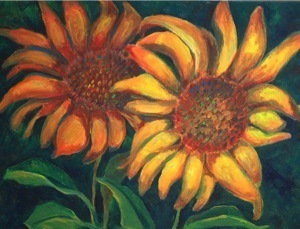
There is a longstanding belief that mental illness and heightened creativity are linked. Personally, I see an association between my imagination and motivation to write and paint, and my illness. Creativity is a constructive outlet for my positive and negative energies.
[image error]
What is the one message you would like readers to take from your memoir?
People with mental illness aren't so different from everyone else despite our portrayal in the media. With the right treatment, there are people with mental illness who function well and contribute to society. I could have fallen by the wayside, but I received support and developed insight into my symptoms.
I know that you’re an artist as well as a writer. I have enjoyed looking at your art work on your website and of course, the cover of ‘My Schizophrenic Life’ is one of your paintings. You have a distinctive style, very colourful and eye-catching. If you had to choose between writing and art, which would you choose?
[image error]
That's a difficult question to answer! I seek variety in what I do. My creativity comes in cycles. Sometimes I paint for days, sometimes I'm really involving in a writing project for months at a time. I don't prefer one over the other, but rather do both at different times.
Do you have any favourite artists? If so, what is it about their art that you like?
As I have a background in art history, there are a lot of major artists and movements I appreciate. However, I particularly enjoy the Fauvists, Expressionists, and many Canadian painters like Tom Thomson, Jack Shadbolt and Gordon Smith. Each of these artists has given me something in the development of my own style especially in the use of colour.
Your latest book is a fiction story. ‘Hell’s Fire’ is a science fiction novella. Is science fiction your favourite genre to write, or have you tried writing other genres?
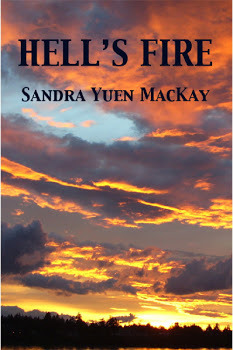
I've written other unpublished stories in different genres. Some explore mental illness, culture, romance, murder, suicide and the paranormal. So I haven't limited myself to one genre however, all of these stories have pieces of my own experience or what I've observed in others.
Who are your favourite authors and what is it about their writing that you like?
I enjoy Margaret Atwood, Jeffrey Archer, Arthur C. Clarke, and Lorna T. Suzukiwho wrote the Imago series. I might add Maria Savva to that list as well! Each of these writers has the ability to wind a tale that totally engrosses me as a reader without a lot of fluff. Reading diverse genres suits my tastes.
Is there a book you own that you’ve read more than once?
I don't own it, but I've read The Handmaid's Tale by Margaret Atwood more than once. I've also read Stephen King's On Writing over again.
What was the last book you read?
Recently, I read Kathryn Stockett's The Help. I liked the way the point of view changed between chapters. Each narrator has a unique voice and personality. Also reading about the racial tension and struggle struck me deeply.
Are you reading a book at the moment?
Currently I'm reading The Girl Who Played With Fire by Stieg Larsson. I find it interesting to see how the characters develop and change over time.
What do you think of e-books?
I don't own an e-book reader but more people are moving that way. Some people still say they prefer to hold a book in their hands, but technology is moving to more paperless communication. I envision e-books in the future that are more interactive where readers can click on words or phrases and link to other trivia sources, or choose the character's next move, complete quizzes, and communicate with authors.
How important are reviews for you as a writer?
Reviews inform potential readers about the quality of a book, which may increase sales. In turn, reviews give me objective feedback, which hopefully can aid me in fine-tuning my future writing.
How do you go about choosing a cover for your books?
For My Schizophrenic Life and Hell's Fire, I designed the covers using my art and photography. The cover may be the customer's first impression of one's book so they have to stand out on the store shelf. I choose images that are a unique, refer to the content in a way, and as you said are "eye-catching."
Are you working on any other books?
I recently submitted a manuscript to some publishers. It's a novel about a Chinese girl who sacrifices for her sister when her parents divorce. Other than that I'm mostly working on my editor's column for "Majestic," an online newsletter for Lit.org, a writers forum.
Do you have any upcoming events that you’d like to tell people about?
On November 1st after 7 pm Pacific Time, I'll be on a Sound Therapy radio broadcast at CJSF 90.1 FM in Burnaby, British Columbia. I will be selling my book and art at some local art fairs if you live near Vancouver and would like to contact me.
Where can people buy your books?
My Schizophrenic Life is available in print & ebook at:
Amazon USA
Amazon Canada
Chapters Indigo - Canada (print only)
Amazon UK
Smashwords (ebook only)
Hell's Fire is available as an e-book at:
Amazon USA
Smashwords
Amazon UK
Some versions of my book are also available on Amazon in Germany, Italy and France.
Where can readers and fans find you on the internet?
Psychopia video at: http://vimeo.com/27794085
My blog, reviews, and radio/video interviews are at: Letters From Sandra
My art can be viewed at: http://symackay.webs.com
or http://www3.telus.net/sandra_yuen_mackay
I'm the editor for Majestic
Thank you, Sandra!
Remember, if you want to enter the draw to try to win a copy of one of Sandra's book, leave a comment below, or click the 'Like' button. Good luck!
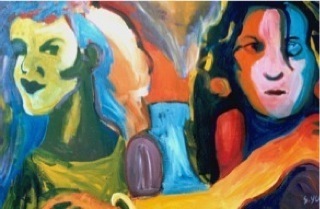
Published on September 24, 2011 13:34
•
Tags:
art, author-interview, ebook, giveaway, hell-s-fire, memoir, my-schizophrenic-life, prize, sandra-yuen-mackay, schizoaffective-disorder, win
An interview with fantasy author J. Michael Radcliffe
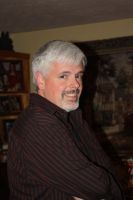
Today, I'm very happy to be introducing you to one of the nicest authors I have had the pleasure to meet on the Internet. J. Michael Radcliffe a.k.a. "Alderdrache" (which means, Elder Dragon) is a fantasy author who joined BestsellerBound in October 2010, and he is one of our most active members on the forum. He also loves cats, which means that naturally he is one of my favourite people.
His novel (book one in the Beyond The Veil series) The Guardian's Apprentice is a wonderful, fantasy tale, for lovers of magic, dragons, wizards, curses, etc., etc. I thoroughly enjoyed the book. Michael has also written many short stories based around the characters in the novel (and the forthcoming books in the series):Beyond the Veil Anthology - the world of The Guardian's Apprentice, Tears for Hesh, Forsaken, and Scale of a Dragon
Michael has very kindly agreed to give away one signed copy of The Guardian's Apprentice and a pdf copy to two lucky readers of my blog. All you have to do to enter is simply 'like' this blog post or leave a comment below. Winners will be picked on the 30th of December 2011.
Here's my recent interview with Michael:
Your novels and short stories are steeped in magic, curses, witchcraft and the like. Do you believe in magic? If so, do you have any interesting stories you could tell us to back up this belief?
Do I believe in magic – now that is an interesting question. There are so many things in this wondrous world of ours that are unexplained – so many mysteries for which science has no answers. I certainly believe there are many things beyond our comprehension – whether or not this qualifies as magic, I’m not certain. I’m inclined to believe there are such things as spirits – or some elevated state of being beyond the physical and I’ll offer this story as an illustration.
In 2002, my father suffered a pulmonary embolism and was placed on life support. After the neurologist had informed us my father was brain dead, my sister and I had to sign the orders to disconnect life support. Late in the evening of the 2nd day, his heart finally stopped and he passed from this world. I and my sister and a couple of others were gathered around the hospital bed as he took his last breath. The moment the heart monitor flat lined and he stopped breathing, the window behind me – previously latched – blew open and a cold night wind rushed through the room, disturbing everything. Was this a coincidence? Maybe; or was it a tortured soul escaping to its final resting place? I may never really know, but I can tell you just the memory of that event gives me chills to this day.
So I suppose that is a long way of saying that yes, I would like to believe there is more to this world than just the physical, everyday things around us. ϑ
In your novel, The Guardian’s Apprentice, the character, Nisha says: “Names can be powerful things... To know someone’s name, especially their true name, is to have power over them.” That made me wonder, is that why you don’t reveal your first name, and go by J. Michael Radcliffe? Is there an element of superstition involved?
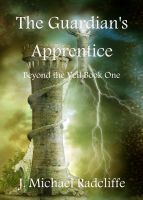
I will let you (and your readers) in on a little known secret. My first name is one I’ve never been entirely fond of; although it was the one I went by as a child in grade school. In school I was overweight and wore glasses – I also read every book I could get my hands on and did not have very many friends. As you can imagine, my self-esteem was not very high.
As an adult, I lost weight, got contact lenses and became more confident in myself, and as I transformed I also started going by my middle name “Michael”. My first name, associated with the persona of an unpopular, introverted teenager, was relegated to the past – thus the initial instead. My wonderful wife, who actually knew me in school, tells me that I am not the same person that I was when I went by that name. So in a way, I guess there is a bit of superstition involved – I avoid using my first name, because I don’t want to be that person any longer!
Nisha is one of the characters in your book who is cursed to remain in animal form for 23 hours a day. Her animal form is a raven. The other character, the wizard, Acamar, is a cat for most of the day. If you could choose to be an animal for some time, what animal would you choose and why?
I would have to say either a cat or (since we ARE talking magic here) a dragon. Ironically I picture both animals – the real and the mythical – as having some of the same traits. Both are fiercely independent, strong-willed and sometimes aloof. Not that I picture myself as having those traits, mind you. Ironically my astrological sign is Leo – a big cat! ϑ
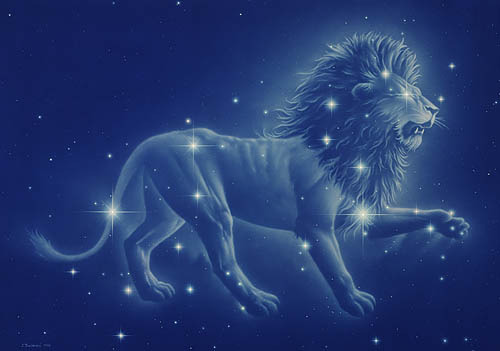
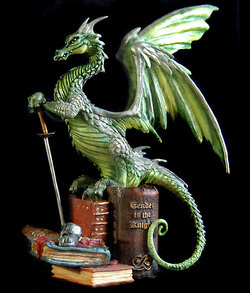
You have four cats. What do you think each of them would be like if they had a human form?
I regret to say we now have FIVE cats – so the humans are outnumbered at our house… Each of our cats has a very distinct personality. I will give you a brief comment about each, in order from oldest to youngest.
Cocoa

Our oldest cat, Cocoa is devious – no, she is evil. She would be the person who hides under the bed just so she could grab your ankle and scare the living daylights out of you. She definitely does NOT play well with others.
Cookie
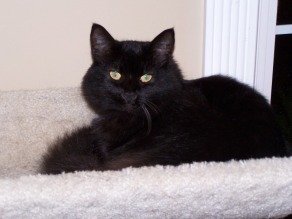
Cookie would make a good princess or perhaps a queen. She is regal, aloof and will only tolerate you for a short period of time, and even then only on her own terms. She certainly does not view me as her owner – I’m more of a butler or valet whose sole purpose is to keep the food bowl full.
Jasmine

Jasmine would be the crazy cousin escaped from the asylum; the recluse who avoids going out in public. She is very clingy, and if you don’t pay attention to her you are promptly bitten.
Maddie
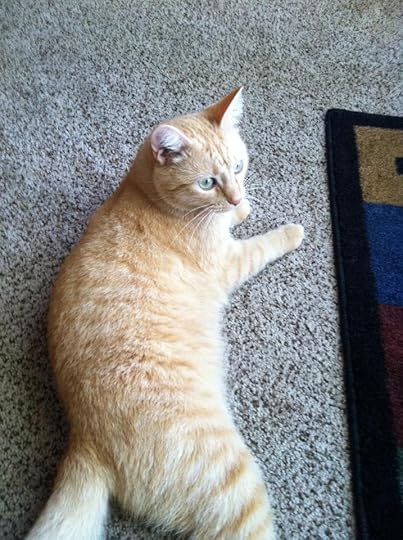
Maddie is fiercely independent, going wherever she wants, whenever she wants – even though she is missing a leg. She would be the strong willed adventurer that lets nothing stand in her way. She would also be the first one eaten by a dragon.
Mickey
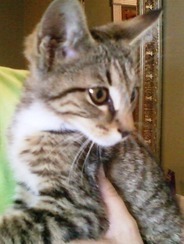
The youngest of our feline army, Mickey would be the big goofy brother that loves to play ‘tag’ or ‘chase’. He loves to run, jump and pounce on the others, and gets a fair amount of abuse from them for it. The other cats definitely do not appreciate Mickey, but he doesn’t let that stop him and he remains as playful as ever, like a loveable little brother.
As well as writing a novel, you have written a few short stories, indeed one of them: Tears for Hesh, is featured in the BestsellerBound Short Story Anthology Volume 1, and another:Scale of a Dragon is featured in the BestsellerBound Short Story Anthology Volume 3. As a short story writer, myself, I know that it’s harder to sell short stories; some people seem to think that because there are fewer words in short stories they are somehow inferior to novels. I have been trying to convince people for years that they are missing out on some great stories by only reading novels. What would you say to encourage people to read more short stories?
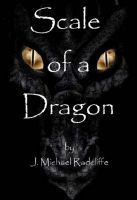
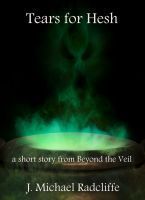
I firmly believe it can be more difficult to write a short story than a novel. With a short story, you have very limited space to fully develop characters and plot. A novel may offer you the luxury of 100,000 words while a short story might just be 5,000! A well written short story is like an hors d’oeuvre – it is a little gem than can be savored quickly, while a novel is like a seven course meal that would take hours. Especially in today’s fast paced world where we all have so many demands on our time, a short story can offer the reader a little escape from reality that only lasts 30 minutes, but leaves them feeling satisfied and refreshed.
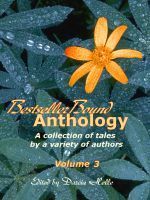
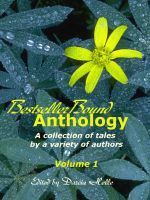
You’ve been a member at Bestsellerbound for some time and you are quite active on the board. Has having a forum like BestsellerBound helped you as an independent writer? If so, in what way?
Absolutely!! I cannot praise BestsellerBound enough. The site has allowed me to connect with such a wonderful group of people such as Darcia Helle, Joel Blaine Kirkpatrick,and of course, you! It is a great place to share ideas, concerns and seek advice. Jumping into the world of writing with no prior experience was a scary thing – this forum helped me find other authors that had the same questions I had when I first went Indie. One certainly will not get any advice or guidance from editors, agents or publishers unless you land a contract.
I know that you are working on the draft of the second book in your Beyond The Veil series. It always interests me to hear how writers go about planning and writing a book series. When you set out to write the story of Beyond The Veil, was it always going to be a series or is that something that you decided later in the process? If so, did you write the whole series before publishing the first one, or do you not yet know what will happen in book three?
I’m ashamed to admit that The Guardian’s Apprentice took me eight years to write. When I first sketched out my idea, I envisioned the story covering an arc of three books. The story has transformed over time however, and now I’m inclined to think it may conclude with two. I won’t say I’m ruling out a third book in the series or even a fourth, but I think all of the plot lines have been nicely resolved at this point. Although I had a definite idea of how the stories would progress, they are much different now than when I first started writing them.
When writing a series of books, does it put more pressure on you as a writer knowing that your audience are waiting for the next book in the series?
Yes, I believe it does. Speaking for myself, knowing there were people interested in Bloodstone definitely increased the pressure to write the story. My website has a nice analytical package that shows me how people find the site and what phrases they query to find it. Over the past year I have noticed more and more queries about book two, and I feel obligated to fulfill the promise I made to my readers. I certainly didn’t want to make them wait eight years, which is how long book one took to finish!
Who are your favourite authors and what is it about their writing that you like?
Oddly enough, I think most of my favorite authors are British. Among my top favorites:
Jonathan Stroud – author of the Bartimaeus Series, he imbues his main character – a demon – with a wonderfully sarcastic sense of humor. His characters come alive in my imagination when I’m reading.
J.K. Rowling– I envy Ms. Rowling’s level of detail – she creates an entire world within her books that just draws the reader in.
Arthur Conan Doyle– I have always loved a good mystery. I love the fact that the Sherlock Holmes stories often hinge on the tiniest of clues for the solution.
James Clavell – author of two of my favorite novels: Noble House and Tai-Pan. Clavell fills his works with strong, believable characters that have depth. The dialogue is great as well.
What was the last book you read?
I am currently reading Darke the seventh book in the Septimus Heap series by Angie Sage. My reading seems to cover a wide range of genres ranging from science fiction to fantasy, naval history and YA fantasy. Perhaps ironically, since becoming a writer I have had much less time to read!
What do you think of ebooks as opposed to print?
I think ebooks have opened up a world of opportunities for independent authors to connect with readers. Before the advent of ebooks and the direct publishing route, my works would never have seen the light of day. I also think they have opened up a world of reading to the electronic generation. Although I still love the feel of turning the pages on a book, I must admit the convenience of purchasing and downloading a new book in a matter of seconds is wonderful.
Do you have any tips for someone who is considering self-publishing their own book?
Based on my experience, I would offer the following advice:
Join a writing group such as Bestsellerbound and connect with other authors
Join a critiquing group such as Critters.org where you critique the works of others and in turn have your works critiqued. It will help make your writing tighter.
Be open to criticism. I know it hurts, BELIEVE me I know. A two star review stings! But, if the reviewer is being honest (ignoring the occasional two star rant that just seems hateful) you can sometimes glean useful tips for improvement. If the reviewer says your book needs more editing – re-read your work and see if they are right. If someone says your dialogue is weak, read over it again and see if they might be right.
Keep writing. If you love to write, then DO it! Don’t let naysayers stop you from finishing a story.
How do you go about choosing a cover for your books?
Selecting and designing artwork for a cover is one of the hardest things for me. I consider it far more difficult than actually writing the story. It took me about four weeks of combing through images before I found one that was “just right” for my second book, Bloodstone – The Guardian’s Curse.

I usually start out with an idea of how I want the cover to look and the feelings I want it to evoke when someone sees it. The tough part is finding the image that fits with what is in my imagination!
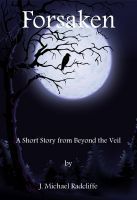
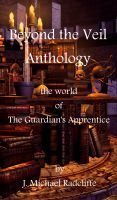
Apart from the next book in the Beyond The Veil series, are you working on any other projects?
I do not have anything in the works at the moment, although I do have a rough outline for another book. This would be a departure from my current series and even from my current genre. This book would be more in the realm of science fiction, though I’m not sure yet if it will ever become a reality. I’ve also had an idea or two for another short story that touches upon characters from my current series.
Where can people buy your books?
My books are available at the following:
Amazon
Smashwords
Sony
Barnes and Noble
Kobo
Do you have your own website or blog where people can read more about your work?
My website is theguardiansapprentice.com and contains a large section devoted to the various creatures and characters from the books and gives some background on them you won’t find in the novels.
I also have a blog at michaelradcliffe.wordpress.com
Thank you Michael!
--------------------------------------------------------------------------------------------------
Remember, if you'd like to be in with a chance to win a signed print copy, or a pdf copy of The Guardian's Apprentice all you have to do to enter is 'like' this blog post or leave a comment for Michael below!
Good luck! :)
Published on December 16, 2011 10:50
•
Tags:
author-interview, beyond-the-veil, cats, contest, dragons, fantasy, giveaway, interview, j-michael-radcliffe, short-stories, the-guardian-s-apprentice, win
Meet author Lilian Duval, and enter to win a Kindle copy of You Never Know!
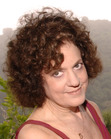
I'm thrilled to be introducing you to author Lilian Duval. Her debut novel,You Never Know: Tales of Tobias, an Accidental Lottery Winner is a highly original and fascinating book about a man who wins an enormous amount of money on the Lottery. It is an intricately woven story that contains fabulous insight into human relationships and raises the question about whether luck or chance can really determine how our lives unfold.
I met Lilian through Bookpleasures.com and am very happy to have connected with her. She is delightful and very knowledgeable about many different subjects, as is reflected in her book. I was keen to interview her because I knew she would make a very interesting guest.
As well as agreeing to answer my interview questions, Lilian has also generously offered to give away a Kindle copy of You Never Know to 2 lucky readers of my blog! To enter, all you have to do is leave a comment below, or simply 'Like' the blog post. Winners will be picked at random on 28th January 2012.
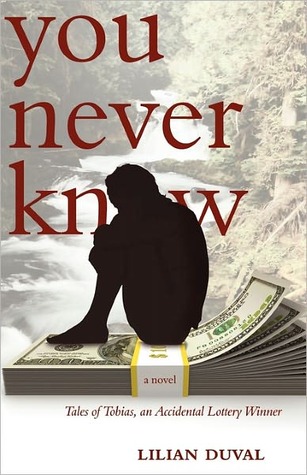
Here are Lilian's answers to my interview questions:
You Never Know as the title suggests deals with the fascinating topic of chance and luck and whether or not we can control our own destinies. Tobias, your main character, is the type of person who seems to plan everything, almost a control freak, whereas his brother, Simeon, is more of a person who lives his life in the moment. Which character do you most relate to in that respect?
Actually, both. I try to plan ahead, but also enjoy taking life as it comes. And I have to tell you a secret: I chose male protagonists so that I would not make them into “Lilian clones.” Sometimes, if my main character is female, I tend to make her too much like me. I wanted Tobias and his brother Simeon to be completely original characters.
In the prologue to your book, you start out by saying that coincidence defines Tobias. Do you believe in coincidences
Yes and no. I struggle with the concept of free will vs. fate. My aim in this book is to leave this conclusion up to the readers: does life unfurl according to plan, or are we the masters of our own destinies?
Tobias and his best friend Martin, meet often to play tennis and during those meetings they open up to each other about the ups and downs in their lives. Do you play tennis? I thought that the way you wrote about it made you come across as a seasoned professional!
Once again, you have hit the nail on the head. Tennis is my literary trick for getting Tobias and Martin to converse and confide in one another. Women seem to do that more easily than men, who are more likely to chat if they’re doing some other activity.
The tennis games in the book also demonstrate the changing status of who’s up and who’s down in the seesaw relationship between two best friends, Tobias and Martin.
My tennis consultant for all these games was my husband George, who is an accomplished amateur tennis player.
It’s no secret that in this novel, Tobias has a stroke of luck when he wins an enormous amount of money in the lottery. What would you do if you won that amount of money?
Give some to our three grown kids, make some home improvements, buy a custom-made classical guitar, and take some trips. Then I would establish and staff a no-kill sanctuary for homeless or feral cats. I would let my husband invest the remaining money to keep it growing.
I think you have done a great job in ‘You Never Know’, at showing that sometimes having a dream come true can be a double edged sword. What was the inspiration behind the novel?
The inspiration was a folder of newspaper and magazine articles about lottery winners that I kept for more than 20 years. A common thread in all these articles was that the winners ended up a rather disappointed lot, in spite of their good luck. Then I read about a psychological study that revealed that accident victims who became paraplegics actually made better long-term adjustments to their new status than lottery winners! You can read about that study here:
Psychological Study Inspired Book
I was impressed by the diverse range of subjects contained within the pages of your novel. How much research did you have to do? And how did you go about carrying out the research?
Research is vital to making fiction seem real. My brother, who’s a psychologist, referred me to specialists who answered my questions about brain damage, alcoholism, and related subjects. I bought and borrowed books on the subject as well. My husband provided the info on tennis and financial matters. My friend, a certified art therapist in NY City, answered all my questions on that subject and even gave me two bona fide art therapy sessions so I could experience what I was writing about.
One of my favourite parts of the book was where the family take a tour of the Amazon in Venezuela. Your descriptions were amazing. Have you ever taken that tour yourself? It seemed like you were writing as someone who had been there.
You are absolutely right. My husband and I took a tour of the Amazon in which many of those events actually happened, including a jungle hike that ended in darkness, and a scorpion sting (I was the victim). As for the visit to the Yanomami natives, I did a lot of reading on the subject, but never actually visited their villages.
In your bio it states that you are a survivor of the World Trade Center terrorist attack. In your book there is a chapter which describes the characters’ experiences on the day. It is a haunting read. How much of the content in You Never Know reflects your own personal experience of that terrible day? Were you near the World Trade Center then?
Yes. My husband and I are both survivors of the 2001 terrorist attacks on the World Trade Center in New York.
On that day, I was heading to New York to my job as a computer consultant for Lehman Brothers in One World Trade Center. My commuter train was in the middle of the New Jersey Meadowlands when the first plane hit, and a conductor came walking through the cars telling everybody.
I got out my Walkman radio and put on headphones to listen, and soon a crowd gathered around me. “A jet plane hit World Trade Center No. 1,” I told them. The radio announcer said it was a 747, and I told them that, too. “And the Kennedy Center,” the radio man said nervously. I repeated it. “No, it was the Pentagon!” the radio man said.
I repeated that to the people huddled around me, and one man said, “We’re at war.” Two of the commuters started crying. Through the windows, we could see smoke coming from downtown Manhattan.
When we arrived at Hoboken Terminal, just across the Hudson River from the attack, the police and FBI were all over the terminal, sending everybody home—no subway trains under the river, no ferry over the river, no buses, no crossing over to New York City.
I got onto a very crowded train heading back to my home town in New Jersey, and one of my colleagues ended up standing next to me in the vestibule. All the way home, I was frantically trying to call my husband in his office at a brokerage firm in the first tower. No answer.
Two weeks later, my colleague reminded me that we had seen the towers crumble from the vestibule of our very slow train. I simply had no memory of that. “No,” I told him, “We didn’t see that. You’re joking.”
“No, I wouldn’t joke about that,” he told me. “Your memory was lost because it was too traumatic.”
I rode my bike home from the train station and sat in front of the TV alone, crying, worrying about my husband, George. At 2:00 in the afternoon, after dozens of phone calls from family and friends, George’s friend called to say that he was safe and he had escaped, but couldn’t call home because of all the cellphone difficulties. Only an hour later did I hear from a relative whom George had been able to reach.
It was 8:00 p.m. before George came home, traumatized and pale, but safe. Two days later, during one of many phone calls to family members, I learned how close he’d come: George had been invited to a presentation in Windows on the World that day, a breakfast meeting, on the 107th floor. His schedule had been so overloaded that he’d forgotten to attend. He didn’t want to tell me that at first, because the catastrophe was so overwhelming.
We didn’t sleep that night, but held hands the whole night. We hardly slept for several nights afterward. Our grown son, who lived in NY City at the time, came home to NJ as soon as traffic was permitted. He and his wife stayed with us for a week or so because they didn’t want us to be alone.
We both returned to work soon after the attack—my husband George as an officer in a brokerage firm, and me as a computer programmer for Lehman Brothers (R.I.P.) But it was never the same. George eventually retired early because of post-traumatic stress disorder. He had watched, horrified, as all the firefighters climbed up the stairs to their deaths, while he and his colleagues climbed down the stairs to safety. In his heart, he knew they were all going to die. As for me, a few months later, I switched careers, from high-pressured programming to technical writing.
We’re both all right now, thankful that our lives were spared, and deeply mournful for those who lost theirs, and for their loved ones who remain.
Simeon, Tobias’s brother is a fabulous artist. You described many of his works as if they were real. Do you draw or paint or have any background in art?
No, I’m an amateur musician. However, I love art and I go to art museums whenever I have the time. I also like to include art in my fiction writing.
I’m always interested in hearing from authors about whether they base their characters on anyone they know, or if they are purely fictional. So, what’s your answer?
All of the main characters in You Never Know are completely fictional: Tobias, Simeon, Martin, and Carmela. Some peripheral characters were based on real people. Near the beginning, there’s an annoying customer in a bookstore who just can’t be pleased, and who brags about not having a television set. He’s based on my rather conceited former guitar teacher. Near the end, there’s an empathetic art therapist. With permission, he’s based on the great Giora Carmi of New York, an outstanding art therapist. Also near the end, there’s a cameo of my husband, who appears as the philosophical tennis coach Ezekiel Lim.
A very important peripheral character is the blind man in the train station. He’s lost in the terminal a couple of weeks before Christmas, and nobody bothers stopping to help him find his track. At the last moment, Tobias, my protagonist, jumps forward and helps the blind man. In so doing, he alters his own fate; shortly after that, he buys a winning lottery ticket to while away the time because he missed his train.
Well, that blind man was real, and that incident really happened to me—all except for the lottery win. It still shakes me up when I remember all those callous people passing by someone who clearly needed help. And just before Christmas, when people are supposed to be nice…
In You Never Know you touch upon the subjects of Art Therapy and Music Therapy. I have long been a believer that art and music can help the healing process especially of the mind. What are your opinions of these types of therapies and did you come across any interesting stories whilst researching for your book that you can share with us on these topics?
Oh, I agree with you on the benefits of these therapies, but don’t know anybody personally who has experienced them, except for me. As part of my research, I participated in two full-length art therapy sessions in New York. After only two sessions, separated by two weeks, I surprisingly found myself waking up in the morning in a cheerful and positive mood.
How long did it take to write You Never Know?
From start to finish, fourteen months.
I understand that you are soon going to publish a short story collection, Random Acts of Kindness. I am eagerly awaiting that! I am also a short story writer and often find that people seem hesitant to read short stories, seeing them as somehow inferior to novels. I love short stories and am always trying to convince people to read more. What would you say to convince people to read more short stories?
Oh, I love these questions. Dear readers: you can read a well-crafted short story in one sitting. In only 20 or 30 minutes, you meet interesting characters, get involved in their lives, feel their struggles, and wonder what you would do in the same situation. Because they have only a few pages in which to reach you, short-story characters are more vivid and colourful than those who inhabit the rambling pages of novels.
Is your upcoming collection of short stories a themed collection, or is each story based on a different theme? Can you tell us anything about any of the stories in the collection?
The general theme uniting all the stories is that somebody performs an act of kindness that was not expected—or, ironically, an expected act of kindness was not performed. Here is a synopsis of all the stories in the collection:
Wish
Marlon Liu, a survivor of the Cultural Revolution in China, escapes from the World Trade Center the day of the 9/11 attack, but life is never the same again for him and his Chinese-American wife Christine, who tries everything possible to cure his post-traumatic stress disorder, including matching him up with a date from a service that provides companions for married people. Therapy is not an option because of cultural prohibitions.
Prodigy
Julian Norman is four years old at the beginning of this story and eighteen by the end. In between, he astonishes adults and defies predictions. His parents’ marriage does not survive. Julian’s piano playing is second to none, but it’s his friendship with a retarded boy of the same age that has the most profound effect on his character development.
Oil on Canvas
Marla, age 36, is the gallery director of a museum and paints nature scenes as a hobby. Blind dates that her friends arrange for her never work out. A neighbor with whom she has little in common falls in love with her artwork, culminating in an unlikely romantic conflict with no easy resolution.
Lucky Two-Dollar Bill
Conrad, a Chinese-American professor, and Lexie, his rebellious teenage daughter, visit his ancestral home in Singapore, where an aging relative teaches them a lesson they never could have anticipated. Conrad is amazed that he and Lexie had to travel halfway around the world to learn how to communicate with each other.
Between Seasons
Deborah, a professional speech therapist, revisits Greenwich Village, where she landed her first summer job as a girl from an immigrant family. She then nearly derailed her college plans and her life, until a routine visit to the family dentist put her in her right mind. Looking back on the scene from adulthood, she wonders who really saved her from catastrophe. Deborah suspects that her parents, now dead, intervened, and she achieves a bittersweet understanding of them.
Hand Me Down
Nessa Foley is the local paragon of righteousness in a Pittsburgh, Pennsylvania suburb. She offers her neighbor Jolene a hand-me-down jacket for her small daughter, Corinna. Jolene is embarrassed when she discovers that Nessa’s own child still needs the jacket. Nessa wants to censor books in the public school library, while Jolene and her husband are proudly open-minded. But little Corinna’s request at the end surprises everyone. “Your children are not your children” is one possible conclusion.
Outsourcing
A research assistant on Wall Street in Manhattan almost loses her job to a brilliant young Indian economist, and then falls in love with him. Their culture clash threatens her sanity as well as her job, while she struggles back to equilibrium at the end of the affair.
Random Acts of Kindness (novella)
Seth Glassman is a middle-aged orthopedic surgeon in New York at the height of his career. His much younger wife Belinda, a black medical resident from Jamaica, is killed on a city street in a random act of violence. Seth closes his practice and moves to rural Massachusetts to grieve alone. After a few months, he begins performing anonymous, random acts of kindness that eventually lead him to a new purpose in life and a love he never would have imagined.
Who are your favourite authors and what is it about their writing that you like?
Tender is the Night by F. Scott Fitzgerald A perfect masterpiece; took 10 years to write.
Into The Heart: One Man's Pursuit of Love and Knowledge Among the Yanomami by Kenneth Good The best adventure story ever.
The Sun Also Rises by Ernest Hemingway In Hemingwayese: “It was a good book, a very good book.”
Inherit the Wind by Jerome Lawrence and Robert E. Lee. All of my ideals in one perfect play.
The Assistant by Bernard Malamud. An impeccable chronicle of conflict and resolution.
Angela's Ashes by Frank McCourt. The most exquisite memoir of all.
The Heart is a Lonely Hunter by Carson McCullers The story of a young girl who craves music.
The Crucible by Arthur Miller. McCarthyism then and now.
Lolita by Vladimir Nabokov. The Bible of all novels. No one could do better.
Is there a book you own that you’ve read more than once?
Oh, yes, many. I read Angela's Ashes and Into the Heart twice in a row. I read Lolita and Inherit the Wind four times each.
Are you reading a book at the moment?
Yes, The London Train by Tessa Hadley, a British author.
What do you think of ebooks as compared to print books?
I myself prefer printed books, but if the invention of ebooks gets people to read more, then I’m a fan!
How important are reviews for you as a writer?
Very important. Reviews are a mirror—I get to see whether people see what I see; whether they are touched by what I wrote. Some analyses of You Never Know taught me things about the book that I hadn’t been aware of myself.
How did you go about choosing the cover for You Never Know?
My publisher designed the foreground. And my brother, an accomplished amateur photographer, provided the background image of the waterfall.
Are you working on any projects at the moment?
Yes, I am fine-tuning the stories in Random Acts of Kindness for publication later this year.
When you’re not writing, what are your favourite pastimes?
I’m an avid amateur classical guitarist and practice 3 hours per day. Once a week I take lessons with a virtuoso guitarist in New York City, and I occasionally give free performances.
Where can people buy your book?
For those who want to see all the reviews, please look at Amazon in the U.S.:
Amazon US
And this is the link for Amazon U.K.:
You Never Know
Do you have your own website or blog where people can read more about your work?
Yes, this is my author website:
Lilian Duval author website
And this is the website for my professional writing service:
Lilian Duval - writing service
Thank you for answering my questions, Lilian!
Thank you so much for inviting me as a guest on your blog, Maria! I wish you all the good things.
------------------------------------------------------------------------------------------------------
Remember, if you'd like the chance to win a Kindle copy of Lilian's book, please leave a comment below, or 'Like' this blog post. We'll pick the winners on 28th January 2012. Good luck!
Published on January 15, 2012 08:25
•
Tags:
author, author-interview, book, contest, giveaway, interview, kindle, lilian-duval, lottery, random-acts-of-kindness, win, world-trade-center, you-never-know
Enter to Win a Signed Copy of Second Chances at Quiet Fury Books!
This month a few BestsellerBound members have got together to offer some free signed print copies of their books.
Up for grabs is a copy of my novel, Second Chances, along with 7 other books:








There are 2 packages of 4 books to be won! For your chance to win one of the prize packages, follow this link: http://quietfurybooks.com/contests.html
Good luck!
Up for grabs is a copy of my novel, Second Chances, along with 7 other books:








There are 2 packages of 4 books to be won! For your chance to win one of the prize packages, follow this link: http://quietfurybooks.com/contests.html
Good luck!
Published on June 02, 2012 04:03
•
Tags:
books, breathing-into-stone, contest, darcia-helle, demo-tapes, gareth-lewis, grey-engines, how-the-west-was-wicked, into-the-light, jaleta-clegg, joel-blaine-kirkpatrick, maria-savva, michael-scott-miller, prize, r-j-mcdonnell, rock-roll-homicide, second-chances, susan-helene-gottfried, win
Summer Romance Festival on fReado! Get involved and you could win a copy of my novel Second Chances!

Freado is a book marketing website that helps independent authors promote their books.
This summer they are having a festival where you can enter to win books. There are over 200 books up for grabs, including my novel Second Chances.
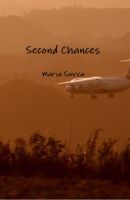
Second Chances is a romantic drama rather than your typical romance novel. You won't find a hero and a heroine, or anyone tearing anyone else's clothes off, but you'll find old fashioned love in between its pages. It's about a couple who are clearly in love with each other but who are facing a point in their relationship where the demands of modern living threaten to tear them apart. Not only that, but there is a secret that requires an explanation. It's a book that explores the couple's emotions introspectively. It's partly inspired from my years working as a divorce lawyer. It also contains a good dose of humour to hopefully entertain as well as paint a portrait of the reality of modern life.
You can find out all about the festival here:
http://www.freado.com/romancefestival/
My book's page on the website is here: Second Chances : http://www.freado.com/bid/1729/second...
If you'd like to take part in the festival and try to win my book, you will get 500 bonus points by using this Code “ROMANCE”.
Good luck, and enjoy the festival!
Published on June 27, 2012 12:47
•
Tags:
books, contest, freado, giveaway, maria-savva, romance, second-chances, summer-romance-festival, win
Want to win a signed copy of Coincidences?? :)
Read my latest interview at the "Feed My Need... For a Good Read" blog, and you can enter to win a shiny new paperback copy of Coincidences (2nd Edition). I will even sign it for you :)
Here's the link:
http://teacherwritebookaholicohmy.blo...
Good luck!!

Here's the link:
http://teacherwritebookaholicohmy.blo...
Good luck!!

Published on July 11, 2012 11:29
•
Tags:
blog, coincidences, giveaway, maria-savva, mystery, win



